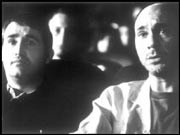USUALLY I HATE date movies, like most straight guys, because they treat us like props—the unfeeling, unthinking accoutrements to squealing feminine spectacle and fantasy. (Just think of poor, paralyzed Ralph Fiennes in Maid in Manhattan, written a part a mannequin could’ve played better.) So the last director you’d expect to produce a hetero-friendly date movie is the famously gay, gynocentric Pedro Almod�. Yet Talk to Her (opening Christmas Day at the Egyptian) is the most straight, male, conventional film he’s ever made. Men are the focus, not women. And men whose wives or girlfriends drag them to see it will be pleasantly rewarded.
There are no divas or campy Hollywood send-ups. Characters matter more than costumes. There’s no torrid melodrama. The film is a romance, yet its real love story is between two men who never sleep together.
Chubby, chatty, nelly-ish nurse Benigno (Javier C᭡ra) has nothing in common with handsome, soulful journalist Marco (Dar��Grandinetti), but they end up being the unlikeliest of pals—like Bogie and Claude Rains in Casablanca. The marvel of it is that their bond feels totally genuine and their characters credible. Talk isn’t particularly deep, but it also isn’t phony. It’s almost like Almod� is daring us to go along with the sheer conventionality of his movie’s message, which, true to the title, boils down to the importance of communication—particularly for taciturn Marco, who only seems able to express himself through tears.
Benigno first witnesses this phenomenon when the two coincidentally sit next to each other at the Pina Bausch dance troupe performance that begins the film. Talk then jumps back and forth through time—title cards read “Four Years Earlier” and “Two Months Later”—to tell the stories of its four main characters: Marco and Benigno, who later meet and become friends; Alicia (Leonor Watling), a dancer who’s been in a coma for four years under Benigno’s personal care; and the striking bullfighter Lydia (Rosario Flores), who falls into a relationship with Marco. Almod� starts the movie as if to compare two couples (Benigno says of Alicia, “We get along better than most married couples”), but the women quickly recede in importance.
THE MOVIE’S TEXTURE helps to make its sentiment more palatable and convincing. Lydia’s bullfighting sequences unfold in swirling slo-mo, and I loved the bit where she’s squeezed with buttonhooks into her beautifully embroidered torera attire. Benigno adoringly massages Alicia’s naked body the way you’d tenderize a chicken. Geraldine Chaplin has a small part as Alicia’s dance teacher; her wisdom is like a signifier of all European cinema—another Almod� flourish. Out of nowhere, Marco attends a live musical performance where Caetano Veloso beautifully sings “Cucurrucuc Paloma” (again—more tears). Such moments are like the quiet flip side of what one imagines the extroverted director’s at-home personality would be— gorgeous, private, and somehow sad.
Fortunately, Almod� hasn’t forsaken his youthful naughtiness; at times it’s like he’s tweaking his own mature, serious tone. “I just took an elephant-sized dump,” one woman declares, apropos of nothing (thanks for sharing). In a silent movie-within-the-movie that Benigno watches, a tiny man—shrunk to a few inches by a science experiment gone wrong— clambers over the breasts of a sleeping woman like sand dunes. (Then he gets really ambitious and goes down on her.)
I don’t know if the 51-year-old Almod� has grown up or what, but Talk feels relaxed and accessible, emotionally direct in a way that’s finally freed from the vocabulary of other films. Maybe that’s why Far From Heaven‘s overdetermined meta-ness is such a drag by comparison; unlike Todd Haynes, Almod� doesn’t need to couch simple ideas in theory-laden melodrama. He’s not trying to prove anything. His protagonists come together by chance, change each other profoundly, then part. (And here’s the date-movie payoff: Even after all his heartache, Marco finally ends up with the girl.) Laughter, tears, tragedy, and hope—movies needn’t be any more complicated than that.









